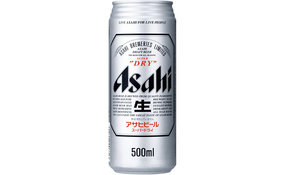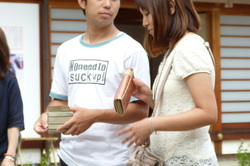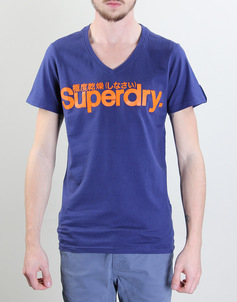I am a rare creature, a student of Japanese in England. In my year in Cambridge, I am one of just six. In Japan, everyone studies English, but in many cases shyness and perfectionism combine and stifle any hope of fluency (I say this without criticism – I have been guilty of the same flaw painfully often). Yet the English language has infiltrated Japanese culture in many ways, and the Japanese understand far more than they realise, or feel capable of reproducing. For a start, the Japanese language is littered with loan words. Directly imported words like konpyuta (computer) are very obvious. Others are compounds or contractions that are quite confusing. A friend left me completely stumped when he referred a few days ago to his basshu – he meant ‘basketball shoes’. To be honest, I wasn’t too disappointed not to have understood that one.
Loan words are rendered in Japanese script and considered part of the language though. Where actual English is a day-to-day, though slightly bizarre, part of Japanese life is often in advertising. A tagline or a slogan will appear, somewhat incongruously, entirely in English, with no translation or explanation. These taglines are often of a kind, riddled with simple, positive words - ‘happy’, ‘enjoy’, ‘sunny’, ‘life’, ‘you’, ‘success!’ The original idea was quite a clever one. Everyone has studied English, but they don’t feel like they speak it. They see a product, they see the word ‘happy’. Not only do they know that ‘happy’ is a good thing(!), they feel good about understanding it. Maybe they’ll feel so good the word ‘happy’ becomes a key part of their decision to, say, rent a car from that particular company (it worked on me!).

When my parents visited me over Christmas we went travelling, and breakfasting in an inappropriately dingy station café we treated ourselves to the “Morning Sunrise Excitement Set”, which was a runny egg, one slice of bread and a bowl of salad. A popular beer in Japan is Asahi ‘Super Dry’, a can of which bears the tagline “Asahi beer is brewed from quality ingredients by using our pure cultured yeast and our advanced brewing techniques. Asahi beer has excellent richness, truly refreshing drinkability and satin smoothness. All year round you can enjoy the great taste of Asahi beer!” When Asahi first put this on their cans, consumers will have loved feeling all sophisticated, sitting and sipping a veritable essay. The majority will have only understood the final sentence, but they will have felt ‘super’ nonetheless. Western companies also get in on the act, because while they are capable of producing accurate English, they have realised that ‘bad primary school textbook’ English sells better.

Nowadays, Japan has got over the novelty of seeing ‘happy’ things everywhere, but this doesn’t mean the trend has died; rather that spurious English is now everywhere. This leads the English-speaking traveller to the wonderful pastime of ‘T-shirt slogan spotting’, although you should by no means limit yourself to t-shirts. I would have quit my job teaching in the next city a long time ago on the grounds that the four-hour round commute is a tad unbearable, were it not for the fantastic slogans and words of wisdom worn proudly and, one suspects, unknowingly on t-shirts, handbags and the occasional trouser leg. “First expression of my DESIRE” was sported by a young man in a bright pink t-shirt within 24 hours of my arrival in September. The phrase “Amusing and sexy golfer” was repeated over and over on the woolly jumper of a man in his 50s (who had fallen asleep and was drooling a little bit). Around Christmas time I saw a young woman carrying a handbag with my personal all-time favourite, “The Ging is liable”. Seriously – what? I get so much childish amusement out of these that I was genuinely stunned last week to read the perfectly sensible and grammatically faultless “Do not spend time beating on a wall, hoping to turn it into a door”.

This has not been my first trip to Japan. Past favourites include:
“The vacant world is over! If you want it”
“I will walk the night future”
“I ain’t no f***ing you!” (worn by a 10-year old girl, censorship added)
“Good man is hard to find”
And finally, worn by a six-year old boy, the single word: “SPUNK!”
“The vacant world is over! If you want it”
“I will walk the night future”
“I ain’t no f***ing you!” (worn by a 10-year old girl, censorship added)
“Good man is hard to find”
And finally, worn by a six-year old boy, the single word: “SPUNK!”
 A bit too 'punk'?
A bit too 'punk'? Why do they do it? It is more than just vaguely knowing words like ‘DESIRE’ and feeling linguistically empowered. Sometimes, mischievous t-shirt vendors are clearly having a laugh at the expense of shoppers (and their six-year old sons). It can simply be a fashion thing though. Interestingly, Union Flags are another common sight on t-shirts, handbags and so on. I once asked a Japanese friend why the British flag was so popular, and she had no idea what I meant – she was wearing it because of the association with punk.
 Is my t-shirt really dry, should I keep it really dry, or maybe I should dry things with it?
Is my t-shirt really dry, should I keep it really dry, or maybe I should dry things with it? Wearing foreign-language slogans is not unique to Japan, of course, though I have never seen it so prevalent anywhere else. Indeed, many of you may own Superdry clothing. Now, I’m sure you all know that Superdry is a British company whose products “combine vintage American styling with Japanese inspired graphics” (Wikipedia, 2013) and I’m equally sure none of you believed it was actually Japanese when you bought your super-cool hoodie with its super-cool Japanese-y writing, not one of you. But did you know that the logo you’ve been sporting, 極度乾燥 (しなさい), is really a command? “Dry extremely!” - not quite so super. Another logo on the Superdry range is 自動車潤滑, which means “car lubrication” (To be fair, I have seen one Superdry t-shirt with 'motor oil' written in English, so there are some warnings to be found).
I have tried to steer clear of poking fun at bad mistranslations that are trying to be good English (many of the signs reminding us of the rules around our university accommodation spring to mind). There are lots, and many of them are quite funny, but rather than being part of the t-shirt slogan culture, they are simply cases of people not doing a very good job. I feel a bit bad laughing at them given I butcher the Japanese language on a daily basis. However, I cannot resist sharing in full this magnificent description of the joys that await you should you order a ‘jumbo parfait’, a massive ice-cream sundae to share between 10-50 people (depending on which you order, and how many days in advance) at a favourite ice-cream café of mine:
I checked, and intriguingly Word’s spelling and grammar check has no problems with any of that.
We ate one of these for a friend’s birthday, enjoyed the buzz-buzz, and it became another wonderful memory from Japan.
We ate one of these for a friend’s birthday, enjoyed the buzz-buzz, and it became another wonderful memory from Japan.
Sam Glynn



